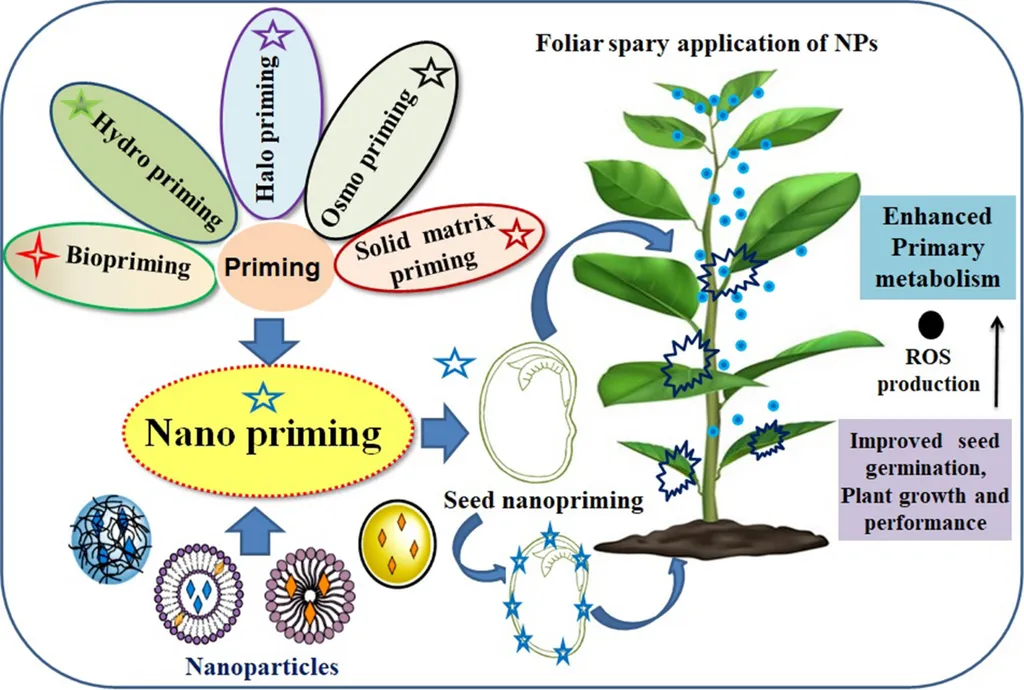In the heart of China Agricultural University, a groundbreaking study led by Zhipeng Yuan from the State Key Laboratory of Maize Bio-Breeding is unlocking new possibilities for enhancing maize seed vigor. The research, published in the journal ‘Plants’ (translated from Chinese), delves into the role of silver nanoparticles (AgNPs) in promoting maize germination, particularly in aging-sensitive varieties. This work could have significant implications for the agricultural sector, potentially boosting crop yields and improving seed quality.
Maize, a staple crop worldwide, often faces challenges related to seed aging, which can drastically reduce germination rates and seedling growth. Yuan and his team investigated the efficacy of AgNPs as a seed priming agent, focusing on two inbred lines: the aging-sensitive I178 and the aging-tolerant X178. The results were striking. “AgNP treatment significantly promoted the germination of I178, increasing it from 55% to 85% compared with water treatment,” Yuan explained. This improvement was accompanied by notable enhancements in root length, shoot length, and lateral root formation.
To understand the underlying mechanisms, the researchers conducted a transcriptomic analysis, examining the gene expression changes in both inbred lines before and after AgNP treatment. In the aging-sensitive I178, AgNP treatment led to a substantial increase in differentially expressed genes (DEGs), with 517 genes upregulated and 283 downregulated. These DEGs were primarily involved in metabolic processes, stress responses, and membrane repair. “Genes related to lipid metabolism and membrane integrity were upregulated, along with seven genes associated with antioxidant action and redox metabolism,” Yuan noted. This suggests that AgNPs might enhance membrane stability and stress tolerance in aging-sensitive maize lines.
In contrast, the aging-tolerant X178 showed a limited transcriptomic response to AgNP treatment. Although 874 DEGs were detected, the number of genes related to key processes did not change significantly, aligning with its inherent aging tolerance.
The commercial implications of this research are profound. By improving seed vigor and counteracting the negative effects of seed aging, AgNPs could enhance crop productivity and seed quality. This is particularly relevant for the agricultural sector, where seed quality directly impacts yield and profitability. “This study provides new insights into the molecular basis of AgNP-mediated seed vigor enhancement,” Yuan stated. “It has potential implications for improving seed quality in agricultural production.”
The findings open doors for further research and practical applications. Future studies could explore the optimal concentrations and application methods of AgNPs to maximize their benefits while minimizing potential environmental impacts. Additionally, the transcriptomic data generated in this study could serve as a valuable resource for identifying key genes and pathways involved in seed aging and stress tolerance.
As the world grapples with the challenges of climate change and food security, innovative solutions like AgNP seed priming offer a promising avenue for enhancing crop resilience and productivity. Yuan’s research not only advances our understanding of the molecular mechanisms underlying seed vigor but also paves the way for practical applications that could revolutionize agricultural practices. With further exploration and development, AgNPs could become a vital tool in the quest for sustainable and productive agriculture.

